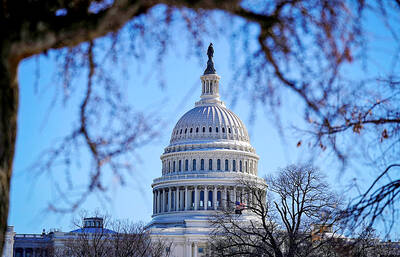Walt Disney Co’s WABC-TV cut its signal to Cablevision Systems Corp subscribers on the eve of the Academy Awards broadcast, after the two companies failed to agree on fees to carry the New York station.
“Cablevision has once again betrayed its subscribers by losing ABC7, the most popular station in the tri-state area,” WABC said in a statement yesterday. “This follows two years of negotiations, during which we worked diligently, up to the final moments, to reach an agreement.”
The action threatened Cablevision customers’ access to Disney’s ABC network telecast of the Oscars ceremony last night in New York and parts of New Jersey and Connecticut. TV networks are trying to extract fees from pay-TV operators for carrying signals broadcast for free, adding a new revenue source as advertising has declined.
“The broadcast networks want to monetize free signals going into everybody’s home already,” Rick Franklin, an analyst at Edward Jones in St Louis, said in an interview on Friday. “Cablevision can’t afford to have ABC dark for long. Otherwise their customers may go someplace else.”
Cablevision said WABC wanted US$40 million a year in addition to the US$200 million paid for cable channels including ESPN. The company urged Disney chief executive officer Robert Iger to reverse the move.
“We call on Bob Iger to immediately return ABC to Cablevision customers while we continue to work to reach a fair agreement,” Cablevision said in a statement.
WABC said it has been seeking an agreement for two years. Cablevision wasn’t sharing any of the US$18 a month customers are charged for a cable package with WABC, the station said. It urged viewers to watch “free, over-the-air, or by switching to one of Cablevision’s competitors.”
Verizon Communications Corp’s FiOS television service has started offering a US$75 discount in New York aimed at converting Cablevision subscribers. A WABC blackout affects customers in Long Island, Westchester, Brooklyn and the Bronx, as well as parts of Connecticut and New Jersey.
Disney, the world’s largest media company, gained US$0.65 to US$33.22 on Friday in New York Stock Exchange composite trading. Shares of the Burbank, California-based company have increased 3 percent this year. Cablevision, based in Bethpage, New York, climbed US$0.21 to US$24.28 and the stock has risen 14 percent this year.
Disney is seeking US$1 a month from Cablevision for each subscriber receiving WABC’s signal, Anthony DiClemente, an analyst with Barclays Capital in New York, wrote in a report on Friday.

CSBC Corp, Taiwan (台灣國際造船) yesterday released the first video documenting the submerged sea trials of Taiwan’s indigenous defense submarine prototype, the Hai Kun (海鯤), or Narwhal, showing underwater navigation and the launch of countermeasures. The footage shows the vessel’s first dive, steering and control system tests, and the raising and lowering of the periscope and antenna masts. It offered a rare look at the progress in the submarine’s sea acceptance tests. The Hai Kun carried out its first shallow-water diving trial late last month and has since completed four submerged tests, CSBC said. The newly released video compiles images recorded from Jan. 29 to

DETERRENCE EFFORTS: Washington and partners hope demonstrations of force would convince Beijing that military action against Taiwan would carry high costs The US is considering using HMAS Stirling in Western Australia as a forward base to strengthen its naval posture in a potential conflict with China, particularly over Taiwan, the Wall Street Journal reported on Saturday. As part of its Indo-Pacific strategy, Washington plans to deploy up to four nuclear-powered submarines at Stirling starting in 2027, providing a base near potential hot spots such as Taiwan and the South China Sea. The move also aims to enhance military integration with Pacific allies under the Australia-UK-US trilateral security partnership, the report said. Currently, US submarines operate from Guam, but the island could

RESTRAINTS: Should China’s actions pose any threat to Taiwan’s security, economic or social systems, China would be excluded from major financial institutions, the bill says The US House of Representatives on Monday passed the PROTECT Taiwan Act, which states that Washington would exclude China from participating in major global financial organizations if its actions directly threaten Taiwan’s security. The bill, proposed by Republican Representative Frank Lucas, passed with 395 votes in favor and two against. It stipulates that if China’s actions pose any threat to Taiwan’s security, economic or social systems, the US would, “to the maximum extent practicable,” exclude Beijing from international financial institutions, including the G20, the Bank for International Settlements and the Financial Stability Board. The bill makes it clear that China must be prepared

Taiwanese trade negotiators told Washington that Taipei would not relocate 40 percent of its semiconductor production to the US, and that its most advanced technologies would remain in the nation, Vice Premier Cheng Li-chiun (鄭麗君) said on Sunday. “I told the US side very clearly — that’s impossible,” Cheng, who led the negotiation team, said in an interview that aired on Sunday night on Chinese Television System. Cheng was referring to remarks last month by US Secretary of Commerce Howard Lutnick, in which he said his goal was to bring 40 percent of Taiwan’s chip supply chain to the US Taiwan’s almost